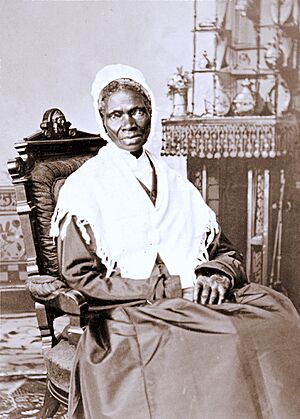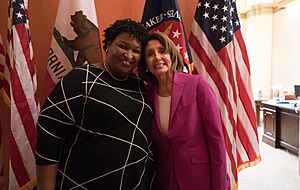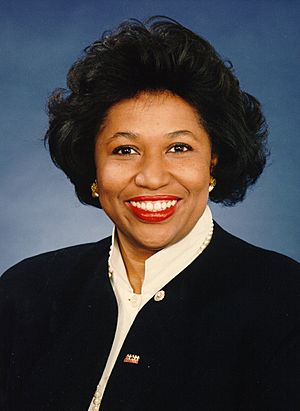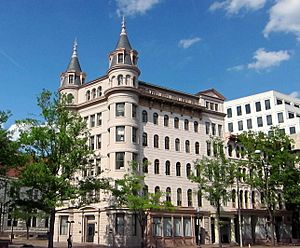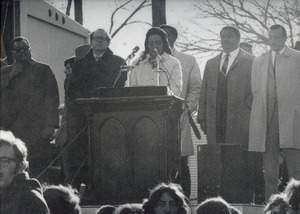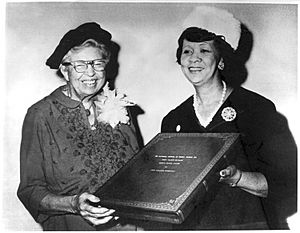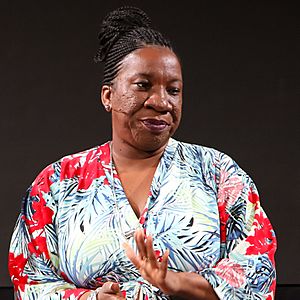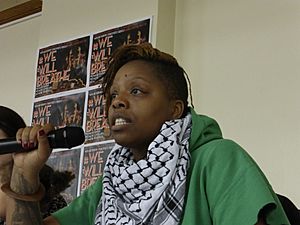Black women in American politics facts for kids
Black women have always been important in American politics and community work, starting from the time of the American Civil War. They have used groups, clubs, and community services to speak up for their communities. Even though Black women are not seen in elected offices as much as they should be, they have been involved in important issues like identity, human rights, and child welfare for many years.
Contents
History of Black Women in Politics
Fighting for the Right to Vote
Many Black women fought for both the end of slavery and women's right to vote. Important figures like Mary Church Terrell, Frances Ellen Watkins Harper, Harriet Tubman, Mary Ann Shadd, and Maria W. Stewart joined women's rights meetings in the 1850s and 1860s. At that time, Black women often felt left out by both Black men and white women who were also fighting for the right to vote. Because of this, Black women often had to march separately.
At the 1851 Ohio Women's Convention, Sojourner Truth, who was an abolitionist and preacher, gave her famous speech, 'Ain't I a Woman?' She was the only Black woman at the meeting. In her speech, Truth asked for equal human rights for all women, not just white women. She also connected the fight to end slavery with women's rights.
Even after women gained the right to vote in the United States in 1920, many women of color still faced problems. Some had to pass difficult tests to vote, while others were threatened. To stop these unfair actions, the Voting Rights Act of 1965 was signed into law by President Johnson in 1965. This law made it illegal to prevent people from voting based on their race.
Women's Voices in the Black Power Movement
The Black Power movement had some parts that were not fair to women. However, women quickly found ways to make their voices heard. Black women took on leadership roles, ran community programs, and fought against unfair treatment. They also helped with local community service efforts. They used their voices and symbols to push for Black Power through groups like tenant councils and welfare rights organizations.
Black Women's Impact on the 2020 Election
The efforts of Black women and other people of color were very important in the 2020 United States presidential election. They helped to encourage and register voters across the country. Stacey Abrams, a former Representative from Georgia, started organizations like Fair Fight Action and New Georgia Project. These groups focused on stopping unfair voting practices and registering new voters.
Abrams and other important women of color worked for years to register voters. They helped register over 800,000 new voters before the 2020 election. In 2016, Georgia voted for Donald Trump. But Abrams and her groups focused on convincing voters of color that their votes mattered. Because of these efforts, Georgia voted for the Democratic party in 2020, which was the first time since 1992. Abrams was also the first Black woman to give a speech responding to the President's State of the Union address.
Black Women in Government
Black women have been underrepresented in politics in the United States, but their numbers are growing. In 2011, 13 Black women served in Congress, and 239 were state lawmakers. By 2021, 27 Black women served in Congress, which is double the number from 2011. Black women often get into public office through women's organizations, rallies, and fundraisers.
Local and State Government Roles
Out of all statewide elected officials, only a small number are Black women. Less than 8% of elected county and local officials are Black women. In 2018, Stephanie Summerow Dumas became the first Black woman to be a county commissioner in Ohio. On April 3, 1973, Lelia Foley became the first Black woman elected mayor in the United States. In 2021, Black women held leadership roles in state legislatures in 42 states.
Serving in the U.S. House of Representatives
So far, 19 states, including the U.S. Virgin Islands and the District of Columbia, have elected a Black woman to the U.S. House of Representatives. Currently, there are 42 Black female representatives and three Black female delegates in the United States House of Representatives. Most of them are part of the Congressional Black Caucus. The first Black woman to serve as a representative was Shirley Chisholm from New York in 1969, during the Civil Rights Movement.
Black Women in the U.S. Senate
The United States Senate has had very few Black women. Only two Black women have served as senators, and both were Democrats. However, more Black women are running for and winning elected positions.
In 1993, Carol Moseley Braun became the first Black woman elected to the United States Senate. She was the only female senator from Illinois and served from 1993 to 1999. Braun famously stood up against the renewal of a patent for the Confederate flag as an insignia. She managed to convince the Senate to vote against it, and the United Daughters of the Confederacy no longer uses the flag.
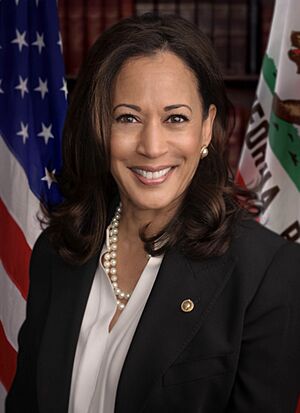
Kamala Harris became a U.S. Senator from California in 2017. She was the second Black woman elected to the U.S. Senate in American history. Before becoming a senator, she served as the District Attorney of San Francisco from 2004 to 2011. She also created units to fight environmental crimes and hate crimes against LGBT youth. In 2010, Harris was elected as California's Attorney General and was re-elected in 2014.
Harris worked well with lawmakers from both parties. She introduced bills with Republican co-sponsors, including a bill about bail reform and one about election security. Harris resigned from the Senate on January 18, 2021, to become the Vice President of the United States. She is the first female and first Black American to serve as the President of the United States Senate.
Black Women in the President's Cabinet
Six Black women have served in the U.S. Cabinet. Patricia Roberts Harris was the first Black woman to serve in the Cabinet. She was appointed Secretary of Housing and Urban Development in 1977 by President Jimmy Carter.
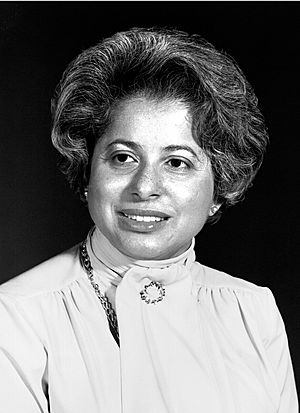
Hazel R. O'Leary became the second Black woman in the Cabinet as Secretary of Energy during the Clinton administration. Alexis Herman was the first Black woman to be the Secretary of Labor under President Bill Clinton. She was also the youngest person to be the Director of the Women's Bureau at age 29.
Condoleezza Rice was appointed Secretary of State in 2005 under the Bush administration. She was the first Black woman to hold this position and the first woman to be the highest-ranking woman in the U.S. presidential line of succession. Rice was also the first woman to serve as the National Security Advisor.
Loretta Lynch served as the 83rd Attorney General of the United States from 2015 to 2017 during the Obama Administration. She was the first Black woman to hold this important office. Her nomination process was one of the longest in U.S. history.
Susan Rice served as National Security Advisor in the Obama Administration from 2013 to 2017. She helped with important international agreements like the Iran nuclear deal and the Paris Agreement on climate change. Rice was later appointed as Director of the Domestic Policy Council under President Biden.
Democratic Congresswoman Marcia Fudge was chosen by President Joe Biden to serve as Secretary of Housing and Urban Development. She is the first Black woman to hold this role since Patricia Roberts Harris.
Supreme Court
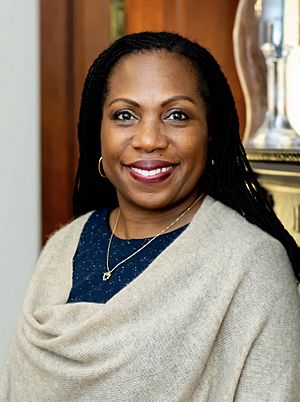
Ketanji Brown Jackson is the only Black woman ever nominated to the U.S. Supreme Court.
Vice Presidents of the United States
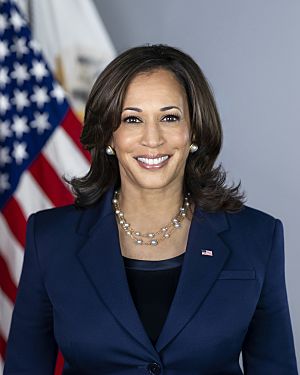
On August 11, 2020, Joe Biden announced that he had chosen Kamala Harris as his running mate for Vice President. On August 19, 2020, Harris became the third female U.S. vice presidential nominee of a major party. She was also the first Black American to be nominated for Vice President by a major U.S. political party.
On November 7, 2020, news outlets announced Joe Biden's victory. This made Kamala Harris the first Black woman and first Indian American to win an election as a vice presidential candidate in U.S. history. Harris was sworn in on January 20, 2021. She became the first female, first Black American, and first Asian American Vice President. Harris later became the first female to serve as Acting President of the United States.
Presidential Campaigns by Black Women
Black women have run for president in several campaigns, but many were not seen as strong contenders. This was sometimes due to their party affiliations, like Charlene Mitchell for the Communist Party USA in 1968, Lenora Fulani for the New Alliance Party in 1988, and Cynthia McKinney for the Green Party in 2008.
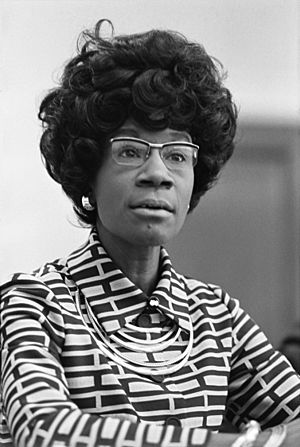
Shirley Chisholm ran for president in 1972 as both the "Black candidate" and the "woman candidate." Even though she was not fully supported by some political groups she helped create, Chisholm still gained 151 votes at the Democratic National Convention.
While not a political office, Michelle Obama, the first Black First Lady, has had a big impact. She became First Lady in 2009 when her husband, Barack Obama, became President. Michelle Obama focused on fighting childhood obesity and created the Let's Move! program.
On January 21, 2019, Kamala Harris announced her candidacy for President of the United States in the 2020 election. Her campaign launch event in Oakland, California, had an estimated 20,000 people. Although Harris initially had strong support, she later withdrew from the race on December 3, 2019.
Challenges for Black Women in Politics
Misogynoir is a term that describes unfair treatment directed at Black women because of both their race and gender. This issue has led to fewer Black women in politics. While the number of Black elected officials has grown since 1965, Black people are still not fully represented in government. Black women make up less than 3% of U.S. representatives, and there were no Black women in the U.S. Senate as late as 2007.
Black women tend to be more active in voting than Black men. This could mean more Black women might hold elected positions. However, due to issues of both race and gender, it has been harder for Black women to rise in politics. When fighting for equal voting rights, Black women often faced sexist men and racist white women who did not see them as equals.
Unfair Claims During the 2020 Campaign
Before and after Vice President Kamala Harris was announced as Joe Biden's running mate in 2020, she faced false claims about her eligibility to serve. Some people claimed she was not born in the United States, which was not true. These claims were quickly proven false by fact-checkers.
Similar false accusations were made about President Barack Obama during his 2008 presidential campaign and throughout his presidency. These claims, called the "birther movement," questioned his birthplace and citizenship, even after his birth certificate was released.
Kamala Harris has also faced criticism about her ethnic heritage. Her father, Donald Harris, is Jamaican-American, and her mother, Shyamala Gopalan, was Indian American. Harris identifies as both Black and Indian. Some people have criticized her for identifying as Black, confusing ethnicity with skin color. News agencies like Reuters have confirmed that she is correctly described as Black, South Asian, and African American.
Arrest of Georgia Representative Park Cannon
On March 25, 2021, Governor Brian Kemp signed a new voting bill into law in Georgia. Many lawmakers, including President Biden, criticized this law, saying it would make it harder for people of color to vote. As Governor Kemp held the signing ceremony, Representative Park Cannon tried to join the meeting by knocking on the Governor's office doors. Officers then handcuffed Cannon and charged her. The incident was filmed by people watching and caused a lot of public anger. People protested to support Cannon. The District Attorney later decided not to pursue the charges against Cannon.
Organizations Supporting Black Women
Many organizations have historically played an important role in politics by supporting Black women. The National Association of Colored Women's Clubs (NACW), founded in 1896, is one of the oldest political groups for Black women. It worked for equal rights, to stop lynching, and to end Jim Crow laws.
Another group, the National Council of Negro Women (NCNW), was founded in 1935 by Mary McLeod Bethune. It aimed to improve life for Black women and their families. The NCNW still works today through research, advocacy, and social services in the U.S. and Africa.
In 1946, Mary Fair Burks started the Women's Political Council (WPC) because Black women were not allowed to join other groups. The WPC worked to improve social services for the Black community and is famous for starting the Montgomery Bus Boycott.
In the 1970s, the National Black Feminist Organization (NBFO) addressed issues unique to Black women, such as racism, sexism, and classism. They insisted that Black women did not have to choose between being Black and being female. Another important group, the Combahee River Collective, was founded in 1974 by Barbara Smith. This group of Black feminists worked to define their politics and cooperate with other progressive organizations. Their "Combahee River Collective Statement" helped develop ideas about identity politics.
In 2014, Leslie Wimes founded the Democratic African-American Woman's Caucus (DAAWC) in Florida. This group aims to give Black women in Florida a stronger voice. Even though Black women have a high voter turnout, this has not always led to more Black women in office. The DAAWC wants to increase the number of elected Black women at state and federal levels and focus on issues important to Black women.
Assata's Daughters was founded in 2015 by Page May in Chicago. It was created to protest the lack of action after Eric Garner's death. The organization is part of the Movement for Black Lives. Assata's Daughters has spoken out against police militarization, immigrant deportation, the Dakota Access Pipeline, and President Donald Trump.
Important Social Movements
Civil Rights Movement
The civil rights movement was a long fight by Black Americans to end unfair racial discrimination, prevent people from voting, and stop racial segregation in the United States. This movement used peaceful protests and eventually led to new laws protecting the human rights of all Americans. During this time, women often took on supportive roles, but some made a big impact.
Coretta Scott King, wife of Martin Luther King Jr., was an active supporter of racial equality. She was a leader in the Civil Rights Movement in the 1960s. After her husband's death in 1968, she continued the fight for racial equality and became active in the Women's Movement. Coretta Scott King founded the King Center for Nonviolent Social Change and worked to make her husband's birthday a national holiday. She also supported LGBT rights and opposed apartheid. She is known as the "First Lady of the Civil Rights Movement."
Dorothy Height is seen as the first leader during the civil rights movement to recognize unfairness for both Black people and women at the same time. She was the president of the National Council of Negro Women for forty years. Height organized "Wednesdays in Mississippi," which brought Black and white women together to talk and understand each other. She fought for equal rights for all. Height was one of the few women involved in organizing the March on Washington for Jobs and Freedom. She is often described as one of the "Big Six" of the Civil Rights Movement, even though her role was often overlooked.
Septima Clark is known for starting "Citizenship Schools" that taught adults in the Deep South how to read. These schools were very important in the fight for voting rights and civil rights for Black people. Clark's schools aimed to build self-pride, cultural pride, literacy, and an understanding of citizenship rights. Teaching reading helped many Black southerners push for the right to vote and developed new leaders. Clark became known as the "Queen mother" or "Grandmother" of the Civil Rights Movement.
Modern Movements
The #MeToo Movement
In 2006, social activist Tarana Burke started using the phrase "Me Too" on the Myspace social network. Burke's goal was to empower women through understanding and support, especially young and vulnerable women.
Black Lives Matter
Black Lives Matter was co-founded by three Black community organizers: Alicia Garza, Patrisse Cullors, and Opal Tometi. The movement began with the hashtag #BlackLivesMatter on Twitter in 2013. This happened after people were upset about George Zimmerman not being found guilty in the killing of 17-year-old Trayvon Martin. Garza wrote a Facebook post saying, "Our Lives Matter, Black Lives Matter." Cullors then created the hashtag #BlackLivesMatter. Tometi added her support, and Black Lives Matter began as an online campaign.
Garza believes the Black Lives Matter movement is a continuation of the long history of resistance by Black people in America. The movement is known for using the internet to bring activists together from different places. This practice, called "mediated mobilization," has since been used by other movements like the #MeToo movement.
The #SayHerName Movement
Some women within the Black Lives Matter movement, like professor Treva Lindsey, have said that the movement sometimes focuses more on Black men's experiences than Black women's. In response, the #SayHerName movement was founded in 2015. Its goal is to specifically highlight the police-related killings of Black women and to make sure their names are remembered in protests. This movement aims to tell a more complete story, not to compete with the overall Black Lives Matter movement.
Activists
| 19th century | |||
|---|---|---|---|
| Sarah J. Garnet | Frances Ellen Watkins Harper | Mary Ellen Pleasant | Josephine St. Pierre Ruffin |
| Harriet Tubman | Sojourner Truth | Ida B. Wells | Henrietta Wood |
21st century
- Melina Abdullah
- Nekima Levy Armstrong
- Jamila Bey
- Kat Blaque
- London Breed
- Cat Brooks
- Tarana Burke
- Gwen Carr
- Vednita Carter
- Ann Nixon Cooper
- Amariyanna Copeny
- Patrisse Cullors
- Brittany Packnett Cunningham
- Theresa El-Amin
- Johnetta Elzie
- Jordan Emanuel
- Yvette Flunder
- Alicia Garza
- Erica Garner
- Haben Girma
- Amanda Gorman
- Miss Major Griffin-Gracy
- Nikole Hannah-Jones
- Elle Hearns
- Isra Hirsi
- Blair Imani
 | Chris Smalls |
 | Fred Hampton |
 | Ralph Abernathy |


